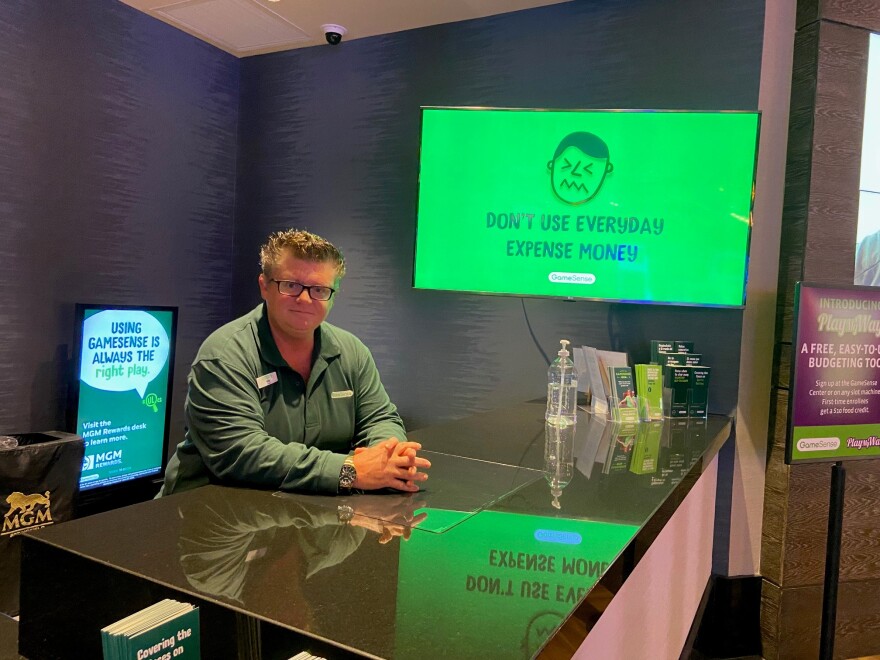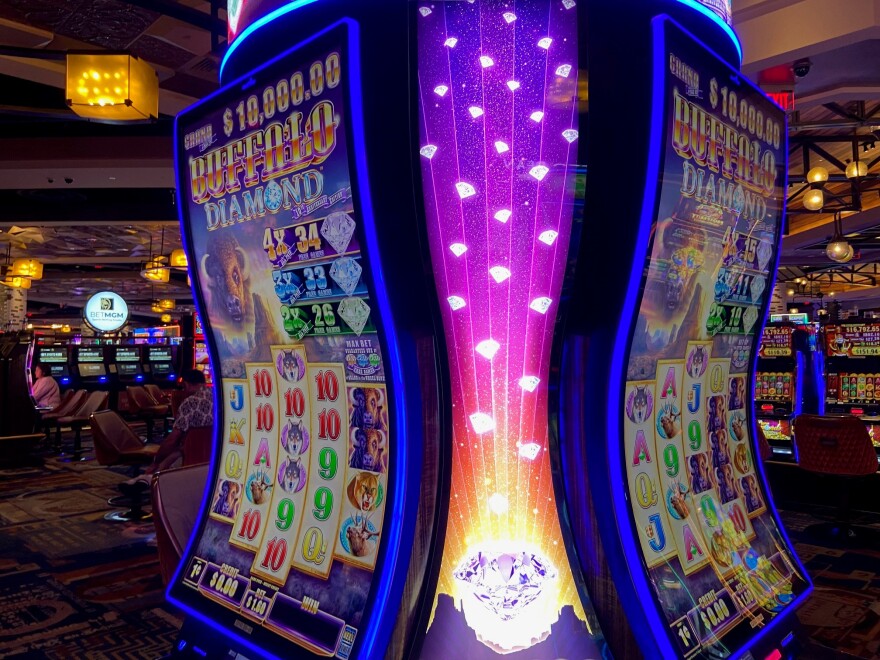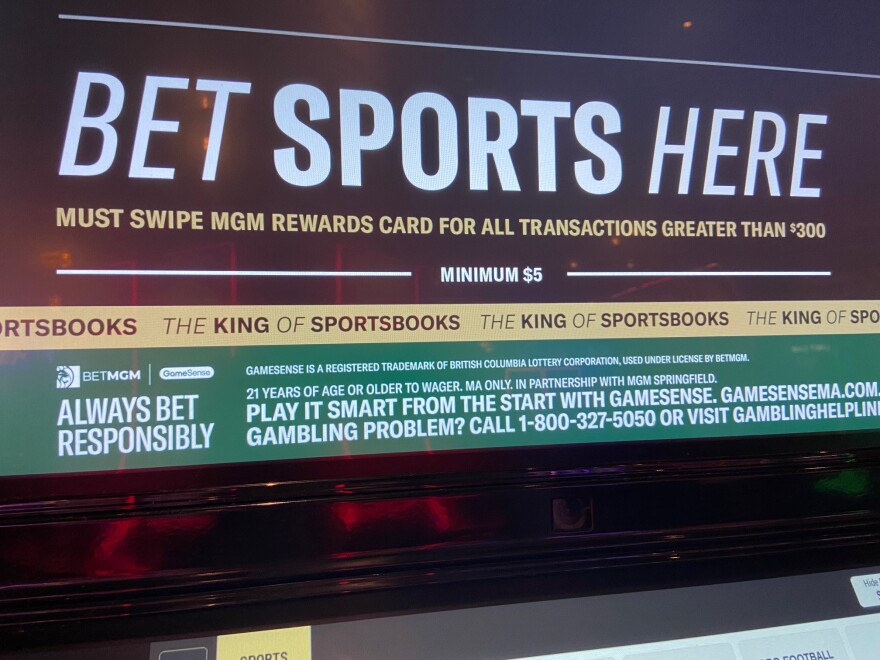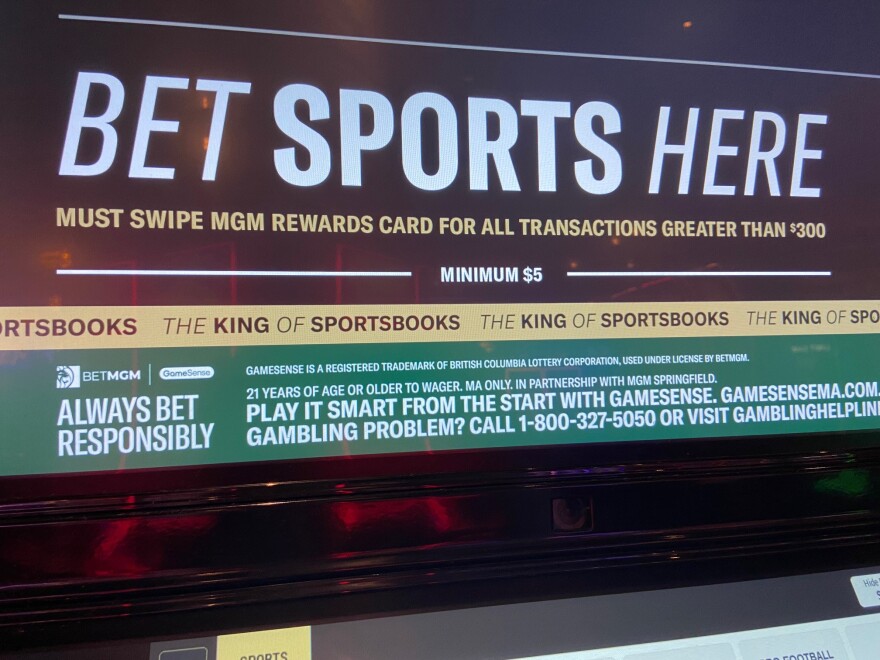Earlier this year, Massachusetts introduced sports betting as the state’s latest form of legal gambling since passage of 2011 casino legislation.
That law is often praised for a key stipulation: every year a portion of gambling revenues must go to mitigate its harms — including inside the casinos themselves.
Today, when you walk into the MGM casino in Springfield, tucked on the side of the main floor, where people are pressing buttons on slot machines, you’ll see an open office with comfy green chairs.
Amy Gabrila stands behind the counter and greets visitors.
“Whether it’s their body language, their facial facial features, you can usually sense when somebody is walking up to the center what they might be there for,” she said.
In some cases, she said, gamblers will just stop to chat; other times, they come to learn how to play the casino games or to spin what Gabrila calls a “swag wheel” — where everyone gets a token prize.
“A lot of times we’re going from super fun, interactive, more learning or teaching,” Gabrila said, “and then having to pivot very quickly to a possible emotional situation where somebody might be experiencing harm; they’re in distress.”

Karen Brown
/
NEPM
Gabrila, 47, works for a program called GameSense, run by the nonprofit Massachusetts Council on Gaming and Health. The state’s regulatory body, the Massachusetts Gaming Commission, funds the program’s $3 million annual budget as part of its mandate to help problem gamblers.
Every day, one or two GameSense advisors, as they’re called, are meant to cruise the casino floor and look out for people in trouble.
“If I’m walking by and somebody makes eye contact, actually looks up from the machine, we say, ‘Hi.’” Gabrila said. “Then I might come up and say, ‘Hey, how are you doing today? Doing good today?’ ‘Oh, no. You know, I spent more than I meant to.’ ‘Oh, yeah? Do you normally try to set a budget?’ And we’ll go from there.”
Like many of her colleagues, Gabrila came from the casino industry; she spent about 20 years as a dealer for table games like blackjack and roulette, and later a floor manager. She enjoyed the work, but occasionally felt guilty for persuading customers to keep gambling. That happened in Gabrila’s first week, when an elderly woman lost her money at one of the tables.
“This lady must have been 80-something years old,” Gabrila said. “And I knew — I knew — I just took her Social Security. I just took her check.”
‘Meeting people where they’re at’
Gabrila’s job is much different today. As a GameSense advisor, she’s charged with helping people to play “responsibly.” That means not judging people for their gambling habits but rather teaching them the real (and low) odds of winning a jackpot — and “meeting people where they’re at.”
Research shows that 2% of the population in Massachusetts has serious gambling addiction — interfering with finances, relationships, mental health — and another 8% is at high risk.
And there’s no national office designated to address those problems the way there is for other addictions, which means every state has to figure out a plan on its own.
“There’s a lot of uncharted territory here,” said Mark Vander Linden, who runs the state Gaming Commission’s responsible gaming and research division.
Vander Linden brought GameSense to Massachusetts from Canada, where it had been developed by the British Columbia Lottery Commission.
Learning the odds
Massachusetts launched GameSense at the state’s first slots parlor, Plainridge Park Casino, in 2015. An early evaluation of the program in 2018 was mixed; it found many of the customer interactions were superficial and did not change gambling behavior, though it also found a majority of people had a positive impression of the program.
But Vander Linden said GameSense has evolved and a new evaluation is underway. He said figuring out the right messaging has been challenging, but they have learned to tailor information to different kinds of players, based on age or gambling habits.
“We know so much more now than we did 10 years ago,” he said. “Saying we can put a brochure out about the odds of a slot machine is really not enough.”

Karen Brown
/
NEPM
GameSense is based partly on the premise that when people understand how unlikely they are to win big at a casino, they are less likely to overspend.
Gambling experts say that can work for some better than others.
“It depends on where along the problem-gambling spectrum they are and why they’re gambling,” said Lia Nower, who directs the Center for Gambling Studies at Rutgers University.
Nower said learning the odds can help people motivated by irrational expectations about winning. But she said that approach is less effective for people who are impulsive, enjoy risk-taking, or have mental health conditions that lead to addictive behavior.
‘I try to make $50 and that’s good’
Gabrila said GameSense is not just about teaching gambling literacy; it’s also about being visible to players.
As Gabrila patrolled the casino floor on a recent afternoon, she ran into a jovial 60-year-old regular named Monroe (who didn’t give his last name out of privacy concerns). He was playing on a craps machine with giant dice.
“I try to make $50 and that’s good,” he said. “These other folks, believe me, that’s how come they don’t last. They’re not here long because they want more.”
Monroe, a Springfield resident, said he understands the more compulsive players around him, because he used to be one, starting 30 years ago in Atlantic City.
“In the old days, it’s like you ain’t got time for nothing else but the gambling,” he said. “You’re all day inside there and it’s like, ‘Do you want to go outside and see the sun?’ ‘No, I’m down. I got to get my money back.’ You get your money back. It’s like, ‘I got to get more.’”
Today, Monroe uses a program called Play My Way, also run by GameSense. It’s a budgeting tool Massachusetts casinos must install on all slot machines to let players set spending limits.
Some countries make players stick to those limits. But Steve Crosby, the former chair of the Massachusetts Gaming Commission, said regulators here decided to keep it optional.
“I think it’s government’s job to make things like this available, but not to mandate that they be used,” Crosby said.
Now that sports betting is ubiquitous, the GameSense team — via the Massachusetts Council on Gaming and Health — is advertising its services more widely, using location tracking and internet searches to target gamblers. In addition, they’re hoping to track online player data to understand when addictive behavior begins and who’s at risk.
Council director Marlene Warner said that could help create a gambling warning system.
“So that instead of waiting for [gamblers] to be in the red zone,” she said, “you will know about it when they’re in the light-green-into-yellow zone, so that you can do something about that ahead of time.”

Karen Brown
/
NEPM
Last resort: self-exclusion from the casino
For now, when players feel out of their depth, they can ban themselves from casinos or sports betting — for a year, five years or forever. Vander Linden said more than 1,500 people in Massachusetts are currently on what’s called a “voluntary self-exclusion” list.
“That’s short of the number of people who would have a gambling problem,” he said. “But for those individuals, our evidence has shown that it has been useful.”
Lia Nower of Rutgers is less confident. She thinks it can be effective for those who choose a lifetime ban, but for shorter terms, she said, “once the person comes off the list, they rebound right back to the prior level if they go back to gambling.”
Everyone on the self-exclusion list is offered recovery support from the Massachusetts Council on Gaming and Health by a staff member we’re identifying by her first initial, J. She asked to stay anonymous because she has a history of gambling addiction.
But that’s also an asset.
“So if someone says, ‘Yeah, I spent all my money at the slot machines and I’m hiding it from my husband,’ I’m like, ‘Yep, yep. I was a slot machine player and I understand that,’” J said. “And I say, ‘You know, sometimes it’s good to take a break and sometimes you need to to stop forever.’”
J said about a quarter of people on the self-exclusion list agree to take her first phone call and a fraction of those agree to further check-ins by phone or text.
J also visits community programs for people in recovery from drugs or alcohol, since they’re especially vulnerable to gambling problems. She said she’ll ask them probing questions about their gambling habits: “‘Is it impacting your finances? Are you hiding it?’ Because when you start keeping something a secret, we sort of know if we’re doing something that’s probably not right.”
At that point, J — like GameSense advisors — is meant to direct problem gamblers to professional treatment. And this is where many say the system falls short.
In part 2 of our series, coming Thursday: While the Massachusetts Gaming Commission oversees GameSense, the exclusion list, and the state’s gambling research, the Department of Public Health is in charge of most prevention and treatment. And some stakeholders are questioning whether those efforts are meeting the state’s need.
